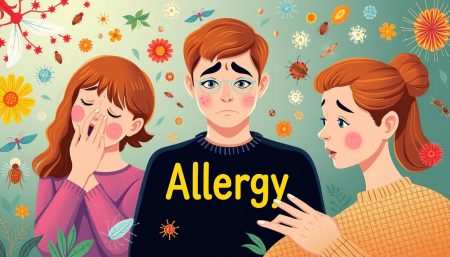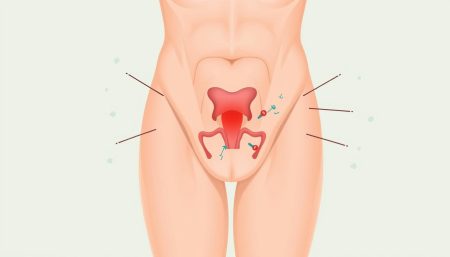Esophageal cancer can sneak up on you, often without you noticing until it’s too late. Spotting the early signs is key to catching it early. This guide will help you understand the symptoms, so you can take care of your health.
Difficulty swallowing, or dysphagia, is a common first sign. You might feel like food is stuck in your throat or chest. This problem gets worse, making it hard to eat and drink.
Unexplained weight loss is another warning sign. Losing weight without trying could mean you’re not eating enough. This might be because food is getting stuck or the cancer is affecting your appetite.
Knowing these signs can help you get medical help fast. Remember, catching esophageal cancer early can greatly improve your treatment chances.
Understanding Esophageal Cancer Symptoms
Esophageal cancer is a serious disease that affects the tube between your throat and stomach. Spotting its symptoms early can greatly improve treatment results. Let’s dive into what this cancer is, how it develops, and the signs to look out for.
What Is Esophageal Cancer?
Esophageal cancer happens when cells in the esophagus grow too much. It can start in the lining and spread deeper. There are two main types: squamous cell carcinoma and adenocarcinoma. Both can cause similar symptoms.
How Symptoms Develop Over Time
Symptoms often start slowly. At first, you might find it hard to swallow. As the cancer grows, swallowing gets harder. You might also feel chest pain or cough a lot. Eating can become tough, leading to weight loss.
Risk Factors and Warning Signs
Many things can raise your risk of getting esophageal cancer. Smoking, drinking a lot of alcohol, and acid reflux are big ones. Watch out for these warning signs:
- Trouble swallowing, mostly with solid foods
- Persistent chest pain or pressure
- Chronic coughing, often when lying down
- Unexplained weight loss
- Hoarseness or voice changes
| Risk Factor | Impact on Cancer Risk |
|---|---|
| Smoking | 5x higher risk |
| Heavy Alcohol Use | 3x higher risk |
| Chronic Acid Reflux | 2x higher risk |
| Obesity | 1.5x higher risk |
If you keep feeling chest pain or coughing, see a doctor right away. Early detection can greatly improve your treatment chances.
Difficulty Swallowing as a Primary Indicator
When it comes to esophageal cancer symptoms, trouble swallowing is a big warning sign. This symptom, called dysphagia, starts slowly and can be missed early on.
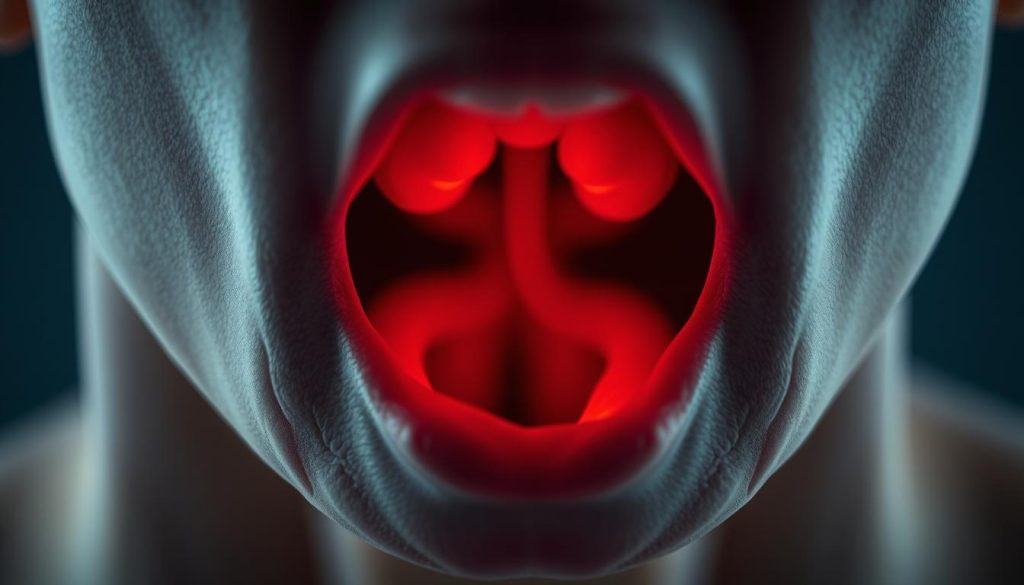
Progressive Dysphagia Patterns
Dysphagia gets worse over time. At first, you might have trouble with certain foods. As it gets worse, swallowing becomes harder. This is a sign that esophageal cancer might be growing.
Food Sticking Sensations
Many people feel like food is stuck in their throat or chest. This can be uncomfortable and even painful. If you feel this often, seeing a doctor is important, as it could be an early sign of esophageal cancer.
Liquid vs. Solid Food Challenges
As the disease gets worse, swallowing problems can happen with both solids and liquids. First, you might struggle with dry or hard foods. Later, even soft foods and liquids can be hard to swallow. This shows you need to see a doctor.
Early detection is key in fighting esophageal cancer. If you notice changes in how you swallow, get medical help right away. Your health could depend on it.
Unexplained Weight Loss and Appetite Changes
Esophageal cancer symptoms often include unexplained weight loss. This change in body mass can be a red flag for many people. When the body fights cancer, it burns extra calories. At the same time, tumors in the esophagus can make eating difficult.
Weight loss linked to esophageal cancer usually happens fast. You might drop pounds without trying. This rapid change can be scary and confusing. It’s not just about losing weight; your appetite might change too. Food might not appeal to you like it used to.
Here are signs to watch for:
- Losing 10 pounds or more without dieting
- Feeling full quickly when eating
- Loss of interest in favorite foods
- Trouble swallowing that leads to eating less
If you notice these changes, talk to your doctor. They can help figure out the cause. Not all weight loss means cancer, but it’s important to check. Early detection of esophageal cancer symptoms can make a big difference in treatment outcomes.
Remember, your body sends signals when something’s wrong. Listening to these signals and acting on them is key to staying healthy. Don’t ignore unexplained weight loss or changes in your eating habits. Your health is worth the attention.
Persistent Chest Pain and Discomfort
Chest pain is a symptom that can worry you. If you have persistent chest discomfort, it’s important not to ignore it. This pain might feel different from other chest pains and could be a sign of your health.
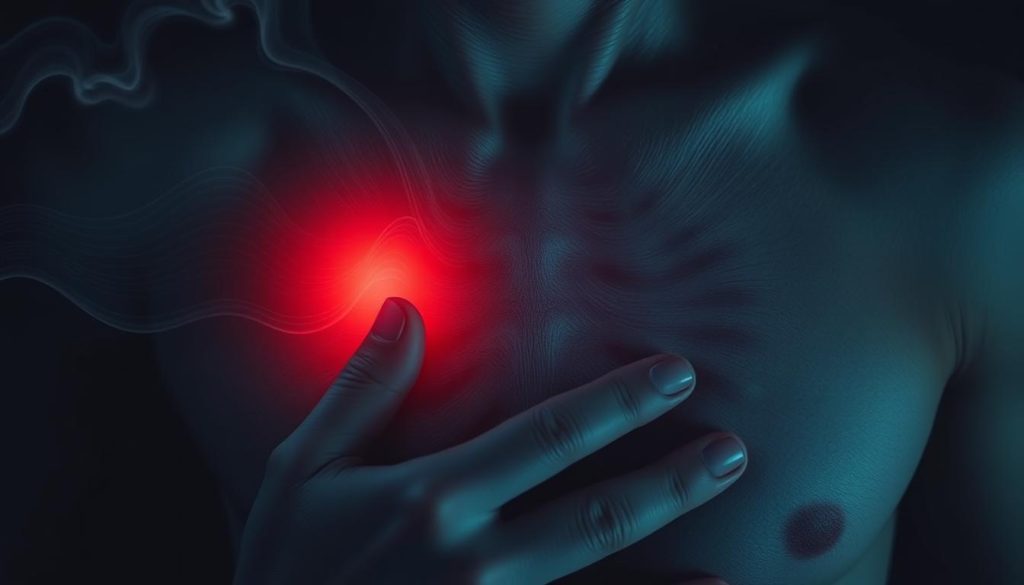
Types of Chest Pain
Esophageal cancer can cause different kinds of chest pain:
- Burning sensation behind the breastbone
- Pressure or squeezing in the chest
- Sharp pain when swallowing
- Dull ache that doesn’t go away
When to Seek Emergency Care
While chest pain from esophageal cancer often gets worse slowly, some symptoms need quick medical help:
- Sudden, severe chest pain
- Pain spreading to the jaw, neck, or arm
- Shortness of breath or difficulty breathing
- Nausea or vomiting along with chest pain
Distinguishing from Heart Problems
It’s important to tell the difference between esophageal cancer symptoms and heart problems. Esophageal pain usually:
- Worsens with swallowing
- May be relieved by antacids
- Doesn’t usually radiate to the arm or jaw
- Often feels like a burning sensation
If you have persistent chest pain, see a doctor right away. Catching esophageal cancer symptoms early can help with treatment and better outcomes.
Chronic Coughing and Respiratory Issues
Chronic coughing can be a hidden sign of esophageal cancer symptoms. Many people overlook this persistent issue, not realizing its connection to a serious condition. When tumors develop in the esophagus, they can irritate nearby tissues and nerves, triggering a nagging cough.
This type of coughing often feels different from a typical cold or allergies. It might be dry and unproductive, or come with a tickling sensation in your throat. Some patients describe it as feeling like something is stuck in their chest, causing them to cough repeatedly.
If you’re experiencing ongoing coughing along with other symptoms like difficulty swallowing or chest pain, it’s important to see a doctor. While not every persistent cough points to esophageal cancer, it’s always better to investigate unusual changes in your body.
- Pay attention to coughing that lasts more than 3 weeks
- Note any changes in your cough’s intensity or frequency
- Keep track of other symptoms occurring alongside the cough
Remember, early detection of esophageal cancer symptoms can make a significant difference in treatment outcomes. Don’t hesitate to seek medical advice if you’re concerned about chronic coughing or other unexplained respiratory issues.
Voice Changes and Persistent Hoarseness
Voice changes can be an early sign of esophageal cancer symptoms. Tumors in the esophagus can press on nearby structures, like the vocal cords. This can make your voice sound different.

Vocal Cord Impact
Esophageal tumors can put pressure on the laryngeal nerves. These nerves control your vocal cords. This pressure can cause:
- Raspy or breathy voice
- Difficulty speaking loudly
- Inability to hit high notes
- Pain when talking
If you notice these changes, seeing a doctor is important.
Duration of Voice Changes
Temporary hoarseness is common, often from colds or too much talking. But if your voice changes last more than two weeks, you should see a doctor. Here’s a table to help you understand the difference:
| Temporary Hoarseness | Persistent Hoarseness |
|---|---|
| Lasts a few days | Lasts over two weeks |
| Improves with rest | No improvement with rest |
| Often linked to colds or allergies | No clear cause |
| Voice returns to normal | Voice remains altered |
Remember, persistent hoarseness doesn’t always mean cancer. But it’s a symptom that shouldn’t be ignored. Finding esophageal cancer early can lead to better treatment.
Digestive Symptoms and Complications
Esophageal cancer symptoms often involve digestive issues. These can range from mild discomfort to severe complications. Recognizing these signs early is key for timely intervention.
Indigestion is a common early warning sign. It may feel like a burning sensation in your chest or upper abdomen. If you experience persistent indigestion that doesn’t improve with over-the-counter medications, it’s time to consult a doctor.
Vomiting can also signal esophageal cancer. This isn’t your typical bout of nausea. It’s frequent and may occur even when you haven’t eaten much. You might notice blood in your vomit, which requires immediate medical attention.
Other digestive symptoms include:
- Difficulty swallowing solid foods
- Feeling full quickly when eating
- Unexplained weight loss
- Persistent heartburn
These symptoms don’t always mean you have cancer. But if they persist for weeks, it’s important to get checked out. Your doctor can perform tests to rule out esophageal cancer or catch it early when it’s most treatable.
Remember, your body often sends signals when something’s wrong. Paying attention to these digestive symptoms could make a big difference in your health outcomes. Don’t hesitate to seek medical advice if you’re concerned about any persistent changes in your digestive system.
Frequent Hiccups and Their Significance
Hiccups are usually harmless and short-lived. But when they persist, they might signal something more serious. In rare cases, frequent hiccups can be one of the esophageal cancer symptoms that shouldn’t be ignored.
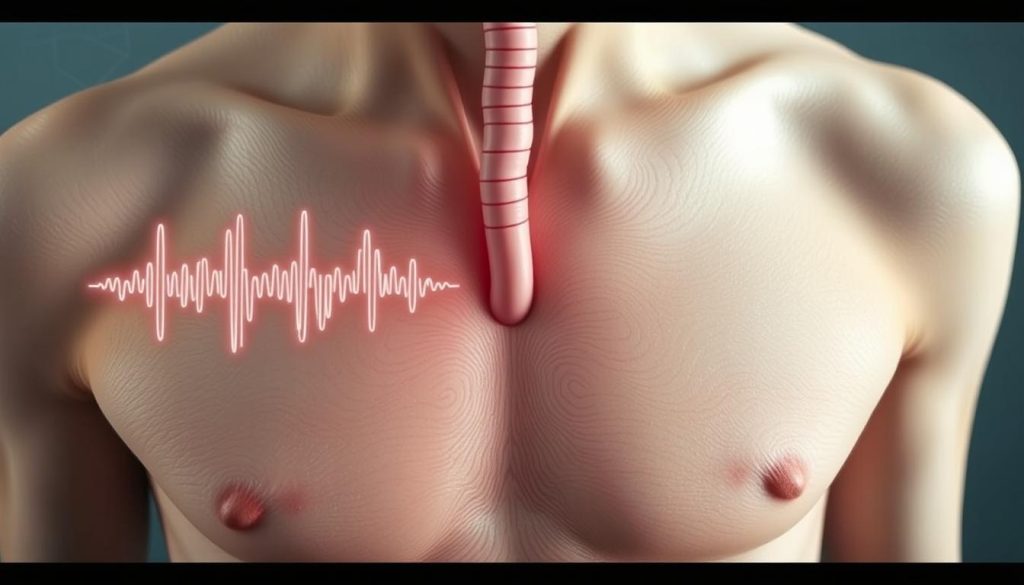
Causes of Persistent Hiccups
Persistent hiccups can stem from various factors:
- Nerve irritation
- Certain medications
- Metabolic disorders
- Tumors in the neck or chest
When hiccups last more than 48 hours or interfere with daily life, it’s time to see a doctor. They might be a sign of an underlying condition that needs attention.
Connection to Esophageal Issues
In some cases, persistent hiccups can be linked to esophageal problems. Tumors in the esophagus can irritate the phrenic nerve, which controls the diaphragm. This irritation can lead to chronic hiccups.
While not all persistent hiccups indicate cancer, they shouldn’t be dismissed when combined with other symptoms like difficulty swallowing or chest pain. If you’re experiencing frequent hiccups along with other concerning signs, consult your healthcare provider for a thorough evaluation.
Chronic Acid Reflux and GERD Relationship
Many people deal with chronic acid reflux and gastroesophageal reflux disease (GERD). These issues can cause ongoing indigestion and discomfort. They might also be linked to serious health problems, like esophageal cancer symptoms.
Long-term acid reflux can harm the esophagus lining. This damage can lead to cell changes, raising the risk of esophageal cancer. If you often have heartburn or regurgitation, it’s key to watch these signs and get medical help.
Not everyone with GERD will get esophageal cancer. But knowing the link can help spot problems early. Here are some important points to remember:
- Frequent heartburn (more than twice a week) may indicate GERD
- Persistent indigestion can be an early sign of esophageal issues
- Difficulty swallowing or food getting stuck are possible esophageal cancer symptoms
- Weight loss without trying could be a sign of a more serious condition
If you have ongoing reflux symptoms, don’t ignore them. Talk to your doctor about your worries and discuss screening options. Managing GERD well can lower your risk and catch issues early.
| GERD Symptom | Potential Esophageal Cancer Symptom |
|---|---|
| Heartburn | Persistent chest pain |
| Regurgitation | Difficulty swallowing |
| Sour taste in mouth | Unexplained weight loss |
| Chronic cough | Hoarseness or voice changes |
Early Detection Methods and Screening
Finding esophageal cancer early can greatly improve treatment chances. Let’s look at the tools and tests to spot this disease early.
Available Screening Tests
Doctors use several ways to check for esophageal cancer. An upper endoscopy is one method. It involves a thin tube with a camera to look for growths.
Another test is a barium swallow. You drink a special liquid that shows up on X-rays. This highlights any issues in your esophagus.
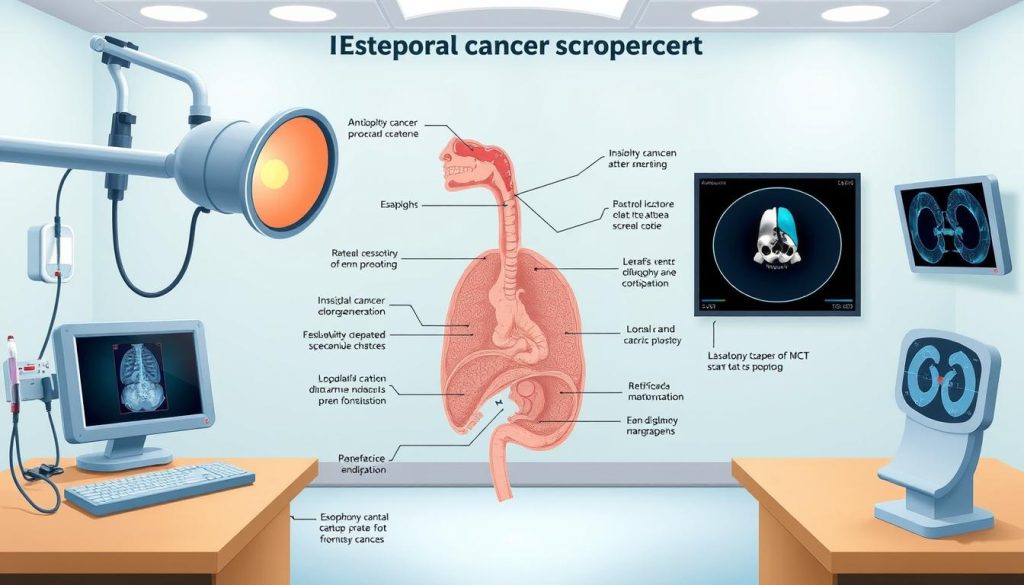
Risk Assessment Tools
Your doctor might use questionnaires or genetic tests to see if you’re at high risk. These tools consider your family history, diet, and smoking habits. If you have ongoing acid reflux or unexplained weight loss, it’s important to talk to your doctor.
When to Get Screened
There’s no one rule for when to get screened for esophageal cancer. But if you have risk factors or notice changes in swallowing or unexplained weight loss, talk to your doctor. They might suggest regular screenings if you have a family history or acid reflux.
Being proactive about your health can lead to better outcomes. Don’t hesitate to discuss any concerns or unusual symptoms with your healthcare team.
Lifestyle Factors Affecting Symptom Development
Your daily habits are key in the fight against esophageal cancer symptoms. What you eat, drink, and do can affect your risk and symptoms.
Smoking is a big problem. It irritates the esophagus and can cause coughing, a sign of esophageal issues. Quitting smoking can greatly lower your risk and boost your health.
Drinking alcohol, when combined with smoking, raises the risk of esophageal cancer. Cutting down on alcohol is good for your esophagus.
Your diet is also important. Eating a balanced diet with fruits and veggies can protect against esophageal cancer. But, drinking very hot drinks or eating lots of processed meats can up your risk.
Being overweight or obese can put extra strain on your esophagus, making symptoms like acid reflux worse. Keeping a healthy weight through exercise and good nutrition can help a lot.
| Lifestyle Factor | Impact on Esophageal Health | Recommended Action |
|---|---|---|
| Smoking | Increases risk, irritates esophagus | Quit smoking |
| Alcohol consumption | Raises cancer risk, specially with smoking | Limit or avoid alcohol |
| Diet | Affects overall esophageal health | Eat more fruits and vegetables |
| Body weight | Excess weight worsens symptoms | Maintain healthy weight |
By choosing better lifestyle habits, you can lower your risk of esophageal cancer symptoms and improve your health.
Advanced Warning Signs and Emergency Symptoms
As esophageal cancer gets worse, some symptoms become more serious. They may mean you need urgent medical help. It’s important to know these signs to get treatment quickly.
Bleeding Indicators
Bleeding is a scary symptom. You might see blood in your vomit or stools. The color can be bright red or dark, like coffee grounds. If you notice bleeding, get medical help fast.
Severe Pain Patterns
Severe chest pain is another warning sign. This pain can feel sharp, burning, or crushing. It might be constant or come in waves. Unlike heartburn, this pain doesn’t get better with antacids. If you have severe or ongoing chest pain, call for emergency care right away.
Spotting esophageal cancer symptoms early is key to better treatment. If you see any of these signs or worry about your health, talk to your doctor quickly. Your health is very important.
FAQ
Q: What are the most common early warning signs of esophageal cancer?
A: Early signs of esophageal cancer include trouble swallowing, unexplained weight loss, and chest pain. You might also notice chronic coughing, voice changes, or hoarseness. If these symptoms last, see a doctor right away.
Q: How does difficulty swallowing manifest in esophageal cancer?
A: Trouble swallowing, or dysphagia, starts with food feeling stuck. It gets worse, making it hard to swallow solids and liquids. Don’t ignore this symptom as it gets more severe.
Q: Is unexplained weight loss always a sign of esophageal cancer?
A: Unexplained weight loss can mean many things, but it’s a big warning sign for esophageal cancer. If you lose a lot of weight without trying, and you’re having trouble swallowing, see a doctor fast.
Q: How can I distinguish between chest pain caused by esophageal cancer and heart problems?
A: Chest pain from esophageal cancer is constant and gets worse when you swallow. It’s in the middle chest or upper belly. Heart pain feels like pressure or squeezing, often going to the arm or jaw. If you have ongoing chest pain, get help right away.
Q: Are chronic hiccups a symptom of esophageal cancer?
A: Yes, long-lasting hiccups can be a sign of esophageal cancer. While hiccups are common, chronic ones with swallowing trouble or weight loss need a doctor’s check.
Q: How does chronic acid reflux relate to esophageal cancer?
A: Long-term acid reflux, or GERD, raises your risk of esophageal cancer. Stomach acid can damage the esophagus, leading to cancer. If you have GERD, manage it well and talk to your doctor about screenings.
Q: When should I consider getting screened for esophageal cancer?
A: Get screened if you have symptoms like trouble swallowing, unexplained weight loss, or chronic heartburn. Also, if you have risk factors like GERD, Barrett’s esophagus, or a family history of esophageal cancer, talk to your doctor. Early detection is key.
Q: Can lifestyle changes reduce the risk of developing esophageal cancer?
A: Yes, lifestyle changes can lower your risk. Stay at a healthy weight, quit smoking, and drink less alcohol. Eat well, exercise, and avoid very hot drinks. These habits help a lot.
Q: What are the emergency symptoms of esophageal cancer that require immediate medical attention?
A: Severe chest pain, trouble breathing, coughing up blood, or vomiting blood are emergencies. They might mean your cancer is advanced or you have serious complications. Call for emergency care if you have these symptoms.












